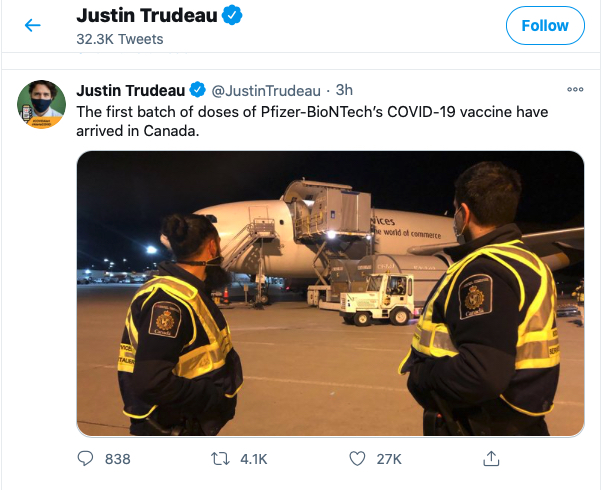
By Fran Yanor / Legislative Reporter
Guarding against potential sabotage, the first few thousand of the Pfizer-BioNTech COVID-19 vaccine doses will arrive in B.C. this week under police protection at two undisclosed healthcare locations in the Lower Mainland.
“We’ve received (information) internationally and from Canadian agencies that there has been a concerted effort to try and interrupt the cold chain and to sabotage immunization programs,” Provincial Health Officer Dr. Bonnie Henry said on Dec. 10.
Typically, vaccines must be carefully packaged and refrigerated to maintain efficacy. The cold chain refers to the process and conditions under which vaccines are stored, transported, and distributed. The Pfizer vaccine requires unusually stringent transportation conditions and storage temperatures of about -70 C.
“We need to make sure that we are taking appropriate precautions to make sure that it is safe, and make sure it’s not tampered with during that whole process,” said Henry.
The initial 3,900 Pfizer shots are B.C.’s earliest allotment of seven vaccines ordered by Canada. In various stages of development, the vaccines will arrive at staggered times dependent on regulatory approvals. The first batches of Pfizer’s vaccine touched down at Mirabel International Airport in Montreal this evening.

B.C. will administer the Pfizer vaccine from two yet-to-be identified healthcare facilities in the Fraser Valley and Vancouver Coastal.
“The RCMP have been involved, and at the national level, the Department of National Defense have been supporting the whole operation across the country,” Henry said.
Earlier this month the International Criminal Police Organization (INTERPOL) issued a global alert warning of the rise in fake vaccines, false COVID-19 cures, and fraudulent testing kits being marketed on the internet.
INTERPOL also identified potential threats to the safe delivery of authentic vaccines and advised law enforcement and health regulatory bodies to work together to protect citizens’ safety.
“As governments are preparing to roll out vaccines, criminal organizations are planning to infiltrate or disrupt supply chains,” said INTERPOL Secretary General Jürgen Stock in a press release Dec. 1. “It is essential that law enforcement is as prepared as possible for what will be an onslaught of all types of criminal activity linked to the COVID-19 vaccine.”
A day after the INTERPOL alert, the cybersecurity branch of IBM revealed its discovery of a sophisticated phishing campaign allegedly intended to interrupt the COVID-19 vaccine supply chain and attack the integrity of vaccines.
Phishing is when someone fraudulently assumes the identify of a trusted person, usually via email, in order to trick the recipient into sharing sensitive or personal data.
According to the IBM report, a cyber attacker posed as a biomedical executive of a company qualified to transport the COVID-19 vaccine. The imposter then sent phishing emails to other corporations in the cold chain sector attempting to gain employee credentials and other confidential logistical data about the vaccine distribution system.
IBM Security provides a range of security software programs to corporations. Since September, the company tracked cyber attacks in Germany, Italy, South Korea, Czech Republic, greater Europe and Taiwan, on biopharmaceutical, IT, and energy companies, along with a department of the European Commission.
The security group wasn’t able to identify the attacker but didn’t think it was an individual.
“Cyber criminals typically go after targets that are much easier to monetize,” said Nick Rossman, global lead for X-Force Threat Intelligence at IBM Security, during a December webinar. “We think (it) was likely a nation state, but we don’t have that confirmed.”
A nation could gain significant espionage advantage from having access to, knowledge of, and control over, aspects of the cold chain, he said.
“Disruption is tantamount to destruction,” said Rossman. “If you’re (interrupting) the network that is running the refrigeration, you’re potentially unfreezing the vaccine and spoiling 10s of 1000s of doses and really undermining the legitimacy and trust that people have in the vaccines around the world.”
The efficacy of the Pfizer and Moderna (expected in the coming weeks) vaccines is reportedly about 95 per cent for preventing COVID-19 and reducing the severity of illness.
“This is a breakthrough in terms of the benefit that a vaccine can have,” said Henry, adding public health had anticipated a 50 to 60 per cent effectiveness. “These may revolutionize vaccines for the future for other respiratory illnesses.”
More immediately, while Henry is comforted knowing Canadian law enforcement and B.C. public health officials are all communicating to guard against sabotage, her eye is fixed on the end game – inoculating British Columbians.
Tens of thousands of doses are expected in B.C. by early January, when vaccine locations will expand to nine across the province, including in Northern Health, with another 21 to follow as additional vaccines arrive. Public health estimates receipt of 400,000 doses by April, and millions more over spring, summer, and fall.
“It’s going to be a very complex operation over the next few months,” Henry said. ”We’re just really excited to get the vaccine, get it going, get it into the arms of people and start saving lives here in B.C.”
Fran Yanor / Local Journalism Initiative / [email protected]



